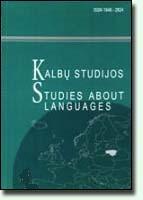Galvijų augintojų pavadinimai vidurinėje anglų kalboje: leksinės-teminės grupės istorinis vystymasis
The Names of Herdsmen in the Middle English Language: Historical Development of the Lexical-Thematic Group
Author(s): Oksana DobrovolskaSubject(s): Middle Ages, Lexis, Semantics, Historical Linguistics, Sociolinguistics
Published by: Kauno Technologijos Universitetas
Keywords: Middle English; occupational terms; the names of herdsmen; etymology; functional differentiation; chronological stratification;
Summary/Abstract: The article is devoted to the general purpose of the study of the etymological composition, functional differentiation and chronological stratification of the thematic group of Middle English names of farm-workers (herdsmen). Middle English occupational terms are distributed into two classes – common names (in their nominating function) and proper names, especially family names (in the function of identification of the person as the component additional to the personal name in the personal nomination formula). Within each etymological group of vocabulary we distribute the lexical material according to the functional principle and distinguish three groups of occupational terms: those functioning as common nouns as well as the proper names; those functioning exclusively as the proper names in the personal nomination formulas; those functioning exclusively as common names. It was found out that the thematic subgroup of Middle English names of herdsmen is represented by 157 words comprising 6.5 % of the total number of Middle English occupational terms; 90 % of them are English words (24 % of them are loan-blends), 10 % are loan-words. Functional differentiation of the vocabulary is different in English and borrowed occupational terms. Chronological stratification of the lexicalthematic subgroup indicates their predominance in the thirteenth century (42 %), as well as in the XIVth century (54 %). Data obtained in the study under review are valuable as the constituent part of the comprehensive study of the etymology and usage of the Middle English vocabulary.
Journal: Kalbų Studijos
- Issue Year: 2017
- Issue No: 30
- Page Range: 73-89
- Page Count: 17
- Language: English

